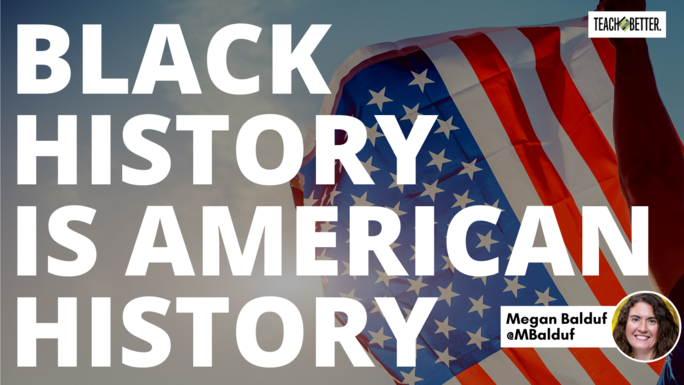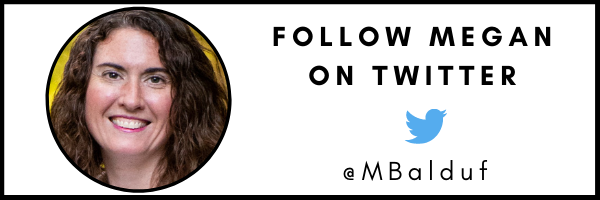TL;DR:
- We need to push for the continued recognition and celebration of Black contributions to culture, science, history, math, the arts, and more.
- Black history is American history; we need to move along Bloom’s taxonomy from “identify” to “create,” and do more than just recognize systemic racism.
- Reframe your mindset from being “called out” to being “called in.” View this as being part of the conversation and part of the solution.
Black History Is American History
Years ago, I worked with a man I’ll call James. James was a Black man who approached his seventh grade American history class with a Black-centric lens. He tied each unit to Black experiences and Black excellence. Eighth grade social studies teachers would talk about how they could always tell, without asking, which students had James the previous year because of what background knowledge the students did and—more often—did not have. I used to roll my eyes when I’d see James and his students in the library researching Black inventors or Black writers. I know others felt the same: why does he make the whole year about Black history? What I didn’t understand was that Black history IS American history.
It’s up to us to push for the continued recognition and celebration of Black contributions to culture, science, history, math, the arts, and more. We need to make every month Black History Month. Click To TweetRise of the “Woke” Teacher
In the years since James left my school, I’ve learned more about the privilege I have because of the color of my skin. I’ve gravitated to writings about structural racism and how my existence continues to hold back people of color. After George Floyd’s murder in May 2020, many people in the U.S. and around the world started taking a hard look at those same issues.
Despite how much white educators learn about white privilege, white fragility, and white rage, as educators, we need to move along Bloom’s taxonomy from “identify” to “create.” We need to do more than just recognize the systematic racism in a situation. We need to embrace a daily practice of including and uplifting the experiences of Blacks.
All content should reflect more than just what white minds can contribute. Study Black inventors in science. Read works by Black writers, especially if they are about Black experiences, in English classes. Black politicians and change agents should be integral to social studies. The feats of Black mathematicians are as important as those of whites. Music and art classes should celebrate the influences of Black creators.
From Calling Out to Calling In
I saw it said on Twitter that people, especially white people, need to reframe the situation if they are “called out” for doing something that has racist undertones. Instead of being put on the defensive and trying to explain our intent, we should see this “calling out” as a “calling in,” an invitation to be part of the conversation and part of the solution.
All those years ago, someone should have “called out” those of us who scoffed at James and his emphasis on Black experiences and perspectives. Doing so would have made us aware of the microaggressions we were using. We would have been uncomfortable. But no one ever changed when they were comfortable.
[scroll down to keep reading]
A Long Road
Unfortunately for us white educators, this will be hard. We often expect to move easily through society, not realizing our whiteness creates a bubble around us. It’s easy to be part of the status quo in that bubble. It’s easy to exist in a way that doesn’t disrupt our lives. Yet if we believe in the premise and promise of Black History Month, that history cannot be relegated solely to one month of the year. No White History Month exists because it doesn’t need to; white history is often just called “history.” Yet that framing diminishes the experiences of all students. All students benefit from a richer, more nuanced take on the lives of others.
We need to be as brave as we ask students to be. It’s up to us to push for the continued recognition and celebration of Black contributions to culture, science, history, math, the arts, and more. We need to make every month Black History Month.
About Megan Balduf
Megan Balduf is an English teacher with more than fifteen years’ experience at the middle school level. While being a classroom teacher had always been her dream, her reality allowed her to reach beyond the walls of her classroom. With the encouragement of administrators at her school in Fairfax, VA, Megan has grown through various leadership positions including mentor teacher and English department chair. As a model of lifelong learning, since entering the classroom, Megan has earned an MA in Gifted Education, an MA in English for Language Arts Teachers, and became a National Board Certified Teacher. In her spare time, she enjoys reading, running, and being Mom to her two children.



